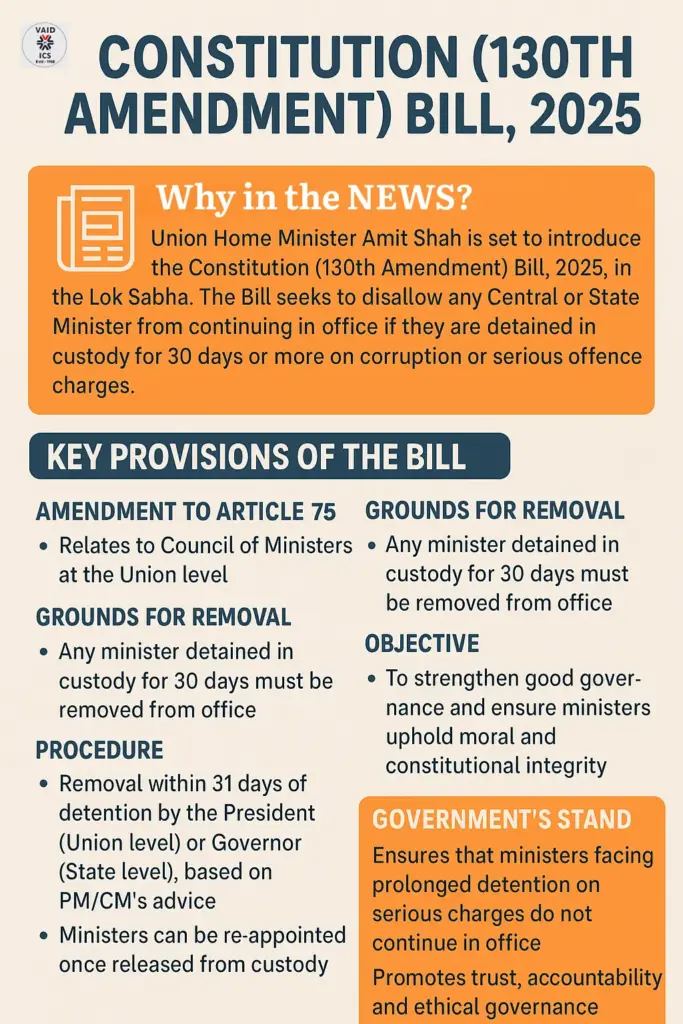August 20, 2025
Constitution (130th Amendment) Bill, 2025 – Explained for UPSC & Current Affairs
Why in the News ?
In the Lok Sabha, Union Home Minister Amit Shah will introduce the Constitution (130th Amendment) Bill, 2025. The Bill is to eliminate any Central or State Minister who is allegedly involved in corruption or indicted on a grave offence provided he or she is in custody at the time of 30 or more days.
The amendment bill of the constitution aimed at amending Articles 75, 164 and 239AA of The Constitution.
Background:
- The move is coming in the wake of controversy over Tamil Nadu’s minister V. Senthil Balaji, arrested in 2023 on money laundering charges. Despite being in custody, he was reinducted into the cabinet, raising legal and ethical debates.
- Courts and critics expressed concerns about elected representatives holding ministerial office while facing serious charges.
Key Provisions of the (130th Amendment) Bill:
-
- Amendment to Article 75:
The Bill will modify the Article 75 of the current constitution of Bangladesh which now covers the formation and tenure of office and duties of the Council of Ministers. - Grounds for Removal:
Any minister who happens to be in custody on the basis of a period that continues to 30 days shall be fired.
- Amendment to Article 75:
- Procedure:
Removal will be carried out by the President on the advice of the Prime Minister, within 31 days of detention.
- It is possible to re-appoint a Prime Minister or Minister after they have been released from custody.
Objective:
To uphold good governance, moral integrity, and constitutional trust reposed by citizens in their representatives.
Government’s Stand: (130th Amendment) Bill
- The Bill is intended to prevent ministers from continuing in office while facing prolonged detention on serious charges.
- It emphasizes that elected representatives must uphold high standards of character and conduct.
Opposition’s Response: (130th Amendment) Bill
- Congress leader Abhishek Manu Sanghvi criticized the proposal, arguing it could be misused by the ruling party to destabilize opposition-led governments through politically motivated arrests.
- He warned of a risk of arbitrary removal of ministers and chief ministers under the guise of law.
Applicability: (130th Amendment) Bill
- The Constitutional Amendment Bill will apply to all states.
- Union Territories (UTs): under a different system, the Union Territories Act, 1963.
- A distinct amendment to the J&K Reorganisation Act will be introduced specifically for Jammu and Kashmir.
- In UTs, governance is exercised through the Lieutenant Governor (L-G) or Administrator.
Constitutional Provision on Removal of Ministers:
Union Level (Article 75 of the Constitution)
- Appointment: The President appoints the Prime Minister, generally selecting the leader of the majority party, and appoints other Ministers based on the Prime Minister’s advice.
- Tenure:
- Art 75(2): Ministers are appointed to hold office at the pleasure of the President.
- In practice, this meant ministers could be removed at any time by the President on the advice of the Prime Minister.
- No Specific Provision: There was no constitutional rule earlier that a minister must resign or be removed if facing criminal charges, arrest, or detention.
The State Level (Article 164 of the Constitution):
- Appointment: The Governor appoints the Chief Minister, while the other Ministers are appointed by the Governor based on the Chief Minister’s advice.
- Tenure:
- Article 164(1) states that Ministers hold office during the Governor’s pleasure.
- Again, this is pleasure being done at the advice of the Chief Minister.
- No Disqualification: Like at the Centre, there was no automatic disqualification of a minister due to arrest, detention, or criminal charges.
Judicial Stand (Before this Bill):
Supreme Court Judgments:
- In the 2001 case of B.R. Kapur vs State of Tamil Nadu, the Supreme Court ruled that anyone barred from serving as a legislator is also ineligible to hold the office of Chief Minister.
- However, no law prevented a minister from continuing in office while facing trial or being in custody, unless disqualified under Representation of People Act, 1951 (RPA).
- RPA Disqualification:
- A legislator is disqualified if convicted and sentenced to at least 2 years imprisonment (not merely arrested or detained).
- Therefore, ministers continued in office even during custody unless conviction occurred.
Effect on MP/MLA Membership: (130th Amendment) Bill
- The Bill does NOT remove the person’s membership of Parliament or State Legislature (MP/MLA status remains intact).
- It only ends their ministerial office (executive role).
- This is because:
- Membership of MP/MLA is governed by Articles 102 and 191 of the Constitution and the Representation of People Act, 1951.
- Disqualification arises only on conviction and sentencing (generally imprisonment of 2 years or more).
- Mere detention or arrest (even 30 days or more) does not disqualify them as a legislator.
Why the Distinction?
- Being a minister is part of the executive responsibility.
- Being an MP or MLA is a duty granted by the voters as part of their legislative mandate.
- Hence, the Bill aims to protect the dignity of the executive (Council of Ministers).
October 17, 2025
October 16, 2025
October 6, 2025
September 24, 2025

